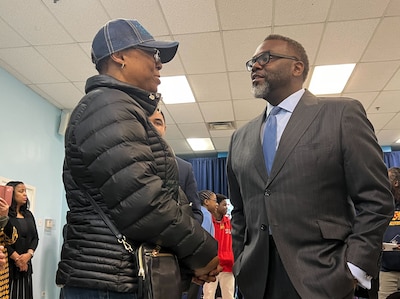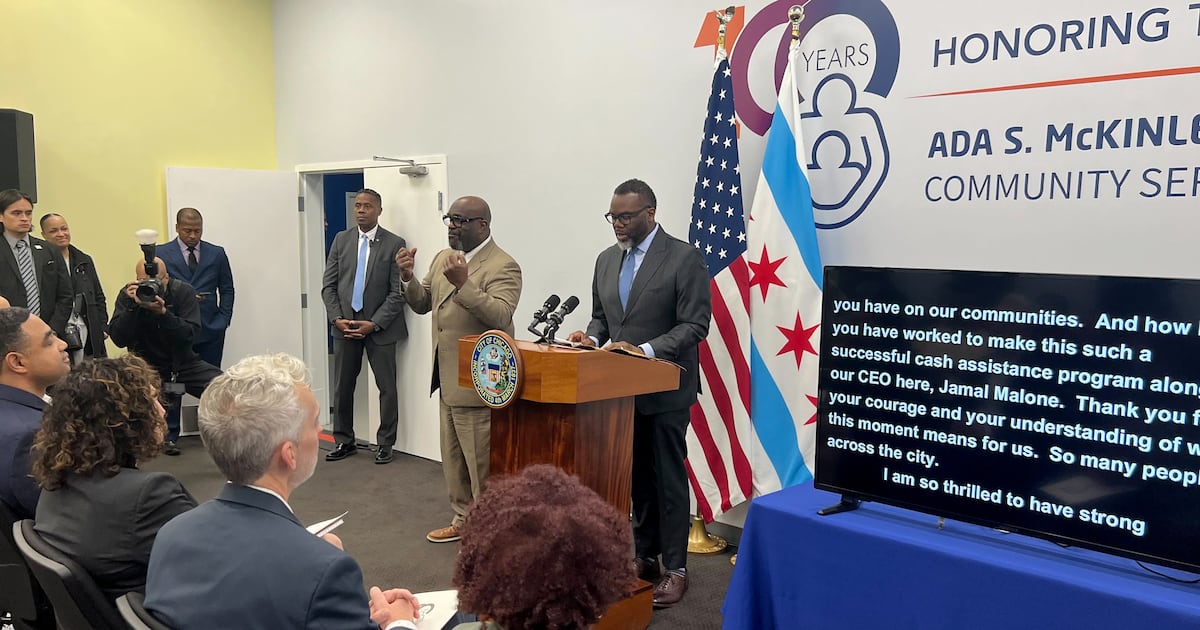To stay up to date on the latest education news, sign up for Chalkbeat Chicago’s free daily newsletter.
The city of Chicago will use pandemic relief funds to provide $500 grants to students with disabilities from low-income families, Mayor Brandon Johnson announced Tuesday.
Families will apply for one-time grants that will be awarded to up to 8,000 people.
The Mayor’s Office of Disability Services, in partnership with Ada S. McKinley Community Services, will distribute $5 million through a new Diverse Learners Recovery Fund supported by American Rescue Plan money distributed by the federal government to help cities and states recover from the pandemic. About $1.9 billion of that funding has been disbursed to Chicago and must be allocated for spending by December 2024, according to the city.
Most of the Diverse Learners Recovery Fund funding will go toward grants for families, with $1 million going toward administrative costs for Ada S. McKinley Community Services, according to a spokesperson for the mayor’s office.
 Shelley Henry, a mother of a child with autism, speaks with Mayor Brandon Johnson during an event announcing $500 grants to low-income families of students with disabilities. (Reema Amin/Chalkbeat)
Shelley Henry, a mother of a child with autism, speaks with Mayor Brandon Johnson during an event announcing $500 grants to low-income families of students with disabilities. (Reema Amin/Chalkbeat)
Shelley Henry, a Hyde Park resident and mother of a 12-year-old son with autism, said her family had unreliable internet access during remote learning, making it difficult for her son to log in to online classes and causing him to fail math classes.
While she didn’t have to pay for the services out of her own pocket, she said the grant helped her buy supplies to address her son’s sensory integration disorder, which affects his ability to process touch and other senses, so she bought him special shoes and recently a tennis racket to help with his grip strength.
“Whenever I hear something like this, I always come back to think about how I can support my son for my own family,” Henry said.
Parents or guardians of students with disabilities may apply for up to two grants per household. Applicants must live in Chicago and have a household income of up to 300% of the federal poverty level, or up to $93,600 for a family of four, according to the U.S. Department of Health and Human Services. They must also provide proof that their child is receiving services such as an individualized education program or 504 plan in school, or a doctor’s certification that their child has a disability.
Speaking at an event announcing the grants, Prime Minister Johnson acknowledged the challenges faced by young people with disabilities during the pandemic, when schools have been closed and “typical support systems” have been cut off.
“Many families have had to make difficult financial choices to ensure their children’s education can stay on track, and I want to thank families for their hard work and the extra time they put in to support and raise their children, especially those with disabilities,” Johnson said.
Students with disabilities have a legal right to receive school services outlined in their Individualized Education Programs (IEPs). These services are intended to provide students with accommodations or special help or therapy at school, but school closures due to the pandemic have left many students with disabilities without access to these important supports.
Like other school districts, Chicago Public Schools has lagged in assessing the supports students with disabilities need: A Chalkbeat investigation found that in the 2019-20 school year, when the pandemic began, more than 10,050 reevaluations, initial evaluations and annual reviews of students’ IEPs were not completed — triple the number from the previous school year.
Sharia Ramey, a Bridgeport mother whose 15-year-old son suffers from epileptic seizures, said she has spent a lot of her own money to meet her son’s needs for services not provided at school, such as a walker to balance her son’s out-of-pocket expenses with other medical costs.
Ramey believes the grant will help many families, but he would like to see more support from the city and public schools, noting that “this is a lifelong commitment for kids with disabilities.”
Josh Long, the new director of Chicago Public Schools’ Office of Diverse Learners, saw firsthand the pandemic’s impact on students as a principal at a school that provided special support to older students with intellectual and developmental disabilities, who suddenly lost the “repetition and consistency” that are so essential to learning, he said.
“The common thread across all of our students was gaps in their learning,” Long said.
Long said he applauded the city’s grant funding idea, which could provide relief to families who pay out of pocket for medical care, food and even transportation to and from therapy services and doctor’s appointments.
Families will be selected through a lottery to receive the grant funding, and those interested can apply online at www.AdaMOPD.com or text “AdaMOPD” to (877) 478-1359.
Applications will be accepted until October 30th.
Reema Amin is a reporter covering Chicago Public Schools. Reema can be reached at [email protected].

